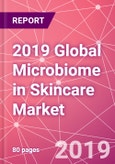This report provides an analysis of the market landscape, product positioning, competitive analysis, and the market size and forecasts for products that use the microbiome in skincare.
Questions addressed in this report include:
- What is the market size and opportunity for skincare products that use microbiome technology?
- How are the competitors in the market positioning their products and marketing their features and benefits?
- What types of skincare products are available in the market and how large is their share? What is their revenue?
- Who are the market leaders globally and in each country researched?
- How are the Eastern and Western markets similar and different?
For purposes of this research, the author has defined products to be those clearly labeled with any of the words: prebiotic, probiotic, postbiotic, or biome-friendly on the packaging, product website or marketing materials.
Countries this research encompasses:
- United States
- Germany
- Korea
- Japan
- Thailand
- China
This study captures the following information on the global microbiome in skincare market:
- Market Size, Growth Rate, Revenue Forecasts (2018-2023)
- Growth Drivers & Restraints
- Market Data
- Quotes by Key Industry Participants
- Market Share Analysis
- Market Trends
Table of Contents
I DefinitionsII Objectives
Companies Mentioned (Partial List)
A selection of companies mentioned in this report includes, but is not limited to:
- AmorePacific (Illiyoon)
- Annemarie Boerlind
- Aurelia
- Bebe&Bella
- Bioelements
- Black Paint
- Burt’s Bees
- Clinique
- Dr. G
- Elizabeth Arden
- Eminence
- Esse Probiotic Skincare
- Gallinée
- Glowbiotics
- Hanmi Pharpaceutical (Clair Therapie)
- ibiotics
- Ildong Pharmaceutical (First Lab)
- Interpharma Group
- Joyōme
- La Roche-Posay
- LACTOClear
- L’Oreal (Lancôme)
- Mother Dirt
- Pierre F
- Plu
- ProBeActive
- Probulin
- S-Biomedic
- The Beauty Chef
- Tomorrow’s Leaf
- Tula
- Yun Perobiotherapy
- YUUU








